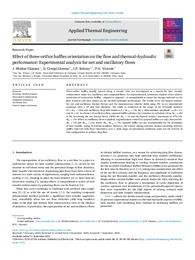Please use this identifier to cite or link to this item:
https://hdl.handle.net/11000/34219Full metadata record
| DC Field | Value | Language |
|---|---|---|
| dc.contributor.author | Muñoz Cámara, José | - |
| dc.contributor.author | Crespí Llorens, Damián | - |
| dc.contributor.author | Solano, Juan Pedro | - |
| dc.contributor.author | Vicente, P.G. | - |
| dc.contributor.other | Departamentos de la UMH::Ingeniería Mecánica y Energía | es_ES |
| dc.date.accessioned | 2025-01-08T11:39:42Z | - |
| dc.date.available | 2025-01-08T11:39:42Z | - |
| dc.date.created | 2024 | - |
| dc.identifier.citation | Applied Thermal Engineering, 236 (2024) | es_ES |
| dc.identifier.issn | 1359-4311 | - |
| dc.identifier.uri | https://hdl.handle.net/11000/34219 | - |
| dc.description.abstract | Three-orifice baffles equally spaced along a circular tube are investigated as a means for heat transfer enhancement under net, oscillatory and compound flows. An unprecedented, systematic analysis of the relative orientation of consecutive baffles– aligned or opposed– is accomplished to assess the changes induced on the flow structure and their impact on the thermal–hydraulic performance. The results cover the Nusselt number, the net and oscillatory friction factors and the instantaneous velocity fields using PIV in an experimental campaign with a 32 mm tube diameter. The study is conducted in the range of net Reynolds numbers 50 < 𝑅𝑒𝑛 < 1000 and oscillatory Reynolds numbers 0 < 𝑅𝑒𝑜𝑠𝑐 < 750, for a dimensionless amplitude 𝑥0∕𝐷 = 0.5 and 𝑃𝑟 = 65. In absence of oscillatory flow, opposed baffles advance the transition to turbulence from 𝑅𝑒𝑛 = 100 to 50, increasing the net friction factor (40%) for 𝑅𝑒𝑛 > 50 and the Nusselt number (maximum of 27%) for 𝑅𝑒𝑛 < 150. When an oscillatory flow is applied, augmentations caused by opposed baffles are only observed for 𝑅𝑒𝑛 < 150 and 𝑅𝑒𝑜𝑠𝑐 < 150. Above 𝑅𝑒𝑛, 𝑅𝑒𝑜𝑠𝑐 > 150, opposed baffles are not recommended for the promotion of heat transfer, owing to friction penalties. However, the chaotic mixing and lack of short-circuiting between baffles observed with flow velocimetry over a wide range of operational conditions point out the interest of this configuration to achieve plug flow. | es_ES |
| dc.format | application/pdf | es_ES |
| dc.format.extent | 15 | es_ES |
| dc.language.iso | eng | es_ES |
| dc.publisher | Elsevier | es_ES |
| dc.rights | info:eu-repo/semantics/openAccess | es_ES |
| dc.rights.uri | http://creativecommons.org/licenses/by-nc-nd/4.0/ | * |
| dc.subject | Oscillatory baffled reactors | es_ES |
| dc.subject | Heat transfer enhancement | es_ES |
| dc.subject | Compound techniques | es_ES |
| dc.subject | Oscillatory flow | es_ES |
| dc.subject | Particle image velocimetry | es_ES |
| dc.subject.other | CDU::6 - Ciencias aplicadas::62 - Ingeniería. Tecnología | es_ES |
| dc.title | Effect of three-orifice baffles orientation on the flow and thermal–hydraulic performance: Experimentalanalysis for net andoscillatory flows | es_ES |
| dc.type | info:eu-repo/semantics/article | es_ES |
| dc.relation.publisherversion | https://doi.org/10.1016/j.applthermaleng.2023.121566 | es_ES |

View/Open:
1-s2.0-S1359431123015958-main.pdf
9,65 MB
Adobe PDF
Share:
.png)
